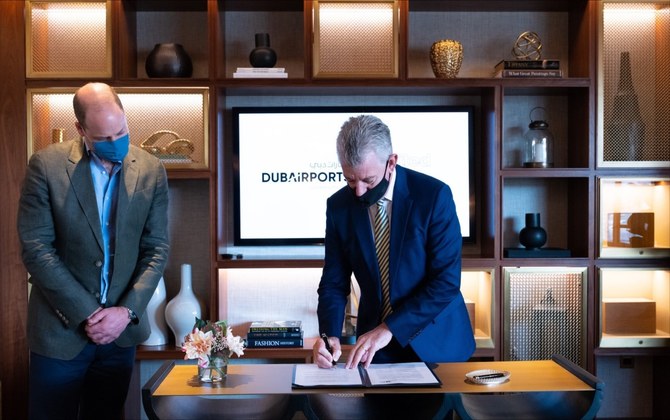LONDON: Britain’s Prince William, founder of United for Wildlife, was present for the signing of an agreement with Dubai Airports to prevent the illegal trade in wildlife, during his historic visit to the UAE, state news agency WAM reported on Friday.
Paul Griffiths, CEO of Dubai Airports, said by signing the “Buckingham Palace Declaration” the international transit hub was committed to thwarting any operations aimed at the illegal trade in wildlife, which is a global issue that ranks among the top five global crimes for profit.
He said the Duke of Cambridge had always been keen to launch global initiatives aimed at preserving the natural environment and combating the illegal trade of wild animals.
And also to see this police car…! pic.twitter.com/BKh4Ss9ECc
— The Duke and Duchess of Cambridge (@KensingtonRoyal) February 11, 2022
Griffiths also said Dubai’s location is a link to all parts of the world, and the emirate has a strategic position as a center for international trade, so strengthening cooperation between Dubai Airports, DP World and Dubai Customs will constitute a strong impetus in the fight against trafficking issues to eliminate the illegal movement of wildlife across borders.
He continued: “Dubai Airports will provide the necessary support and jointly coordinate with partners and relevant authorities from all over the world to share data, find and develop strategic solutions and set policies that contribute to addressing this international issue because of its critical importance.”
Meanwhile, Prince William attended the first-ever Earthshot Prize Innovation Showcase at the DP World Pavilion at Expo 2020 Dubai
Working together with @EarthshotPrize to inspire optimism & action to scale eco-innovations that will put our planet on a sustainable path and protect our world for generations to come.
Thank you @DP_World for hosting and for your continued support of our Finalists, & the Prize. pic.twitter.com/DM4kPjKGgv
— The Duke and Duchess of Cambridge (@KensingtonRoyal) February 10, 2022
Prince William, was joined by Sheikh Ahmed bin Saeed, chairman of the Dubai Civil Aviation Authority, CEO of Emirates Group and chairman of Dubai Airports, and Sultan Ahmed bin Sulayem, Group Chairman and CEO of DP World.
He praised an announcement of a £1 million ($1.355 million) investment in two Earthshot Prize finalists, designed to scale their work in the UAE and Middle East.
“The Earthshot mission is more than just a prize. It’s a global team effort to spark urgent optimism and game-changing innovation to transform our future. I’m inviting all of you to join the Earthshot team and support our finalists — the eco-innovators — to take their solutions to scale,” said Prince William.
Queen Rania of Jordan, who participated via video message, said: “Every sector has a role to play public, private, philanthropic, and the bottom line could not be clearer: If we work together, everybody wins.”
Inside the pavilion is the promotion of our advancements in innovation, space, and artificial intelligence.
It’s one of the largest, self-built spaces at the expo, creating a global collective message projecting unity. pic.twitter.com/43mDAQ06Rq
— The Duke and Duchess of Cambridge (@KensingtonRoyal) February 10, 2022
With the funds, the finalists will begin collaborative work on reef restoration in the region, including scoping for the first commercial land-based coral farm for reef restoration in the Middle East.
This investment will scale their innovative work creating panels that mimic natural habitats like rock pools and mangrove roots, which are fitted to coastal sea defenses to return marine life to coastal shorelines.
DP World’s commitment will fund the design and installation of the largest living seawall on the planet adapted to support the native marine life of the UAE and wider region.
“Our business is connected to the oceans and their protection is an important priority across all our operations as part of our sustainable business commitments evidenced by our target of net zero carbon emissions by 2040,” said Bin Sulayem.





























